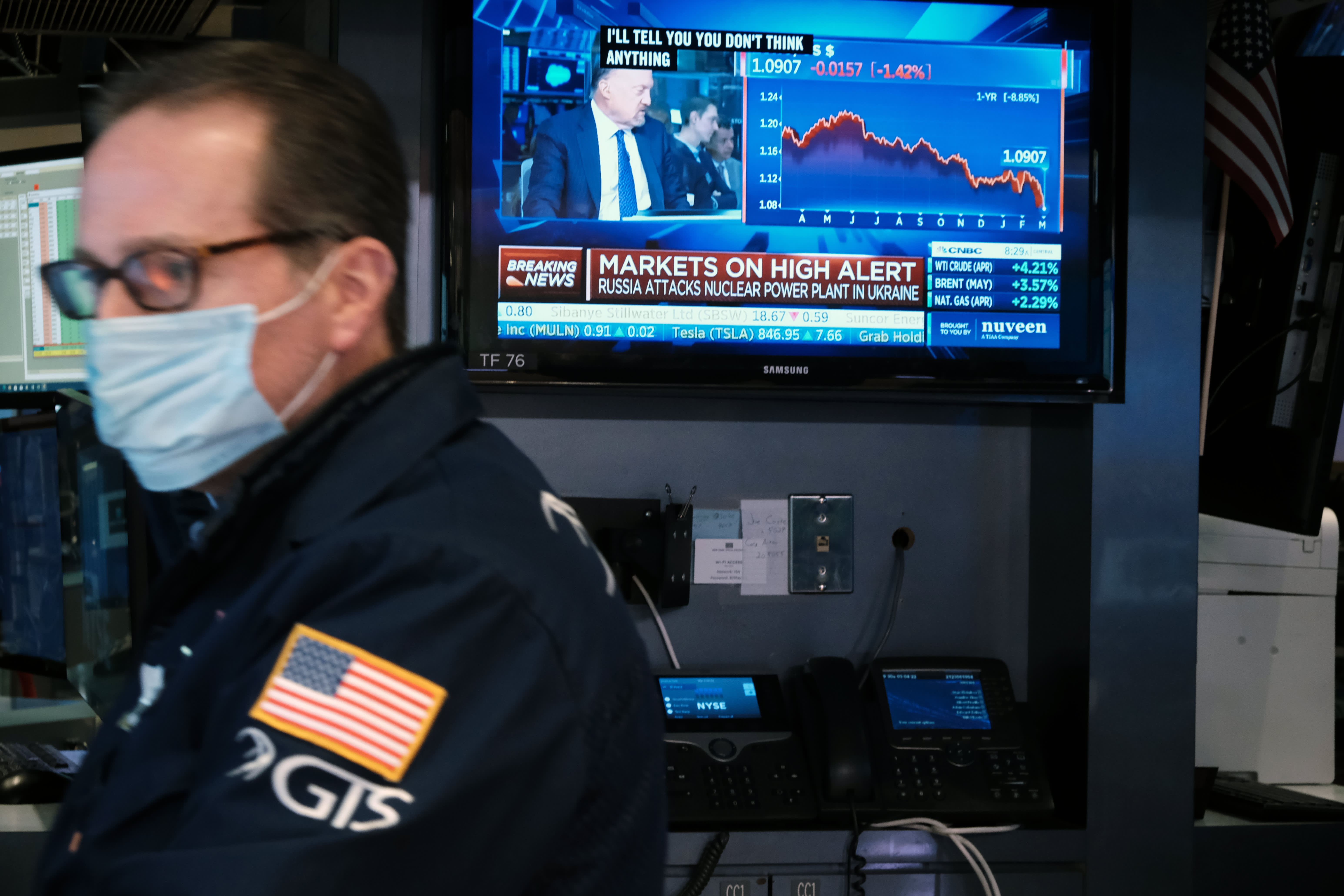
Stocks fell on Friday despite a stronger-than-expected jobs report as worrisome developments in Ukraine weighed on sentiment.
The Dow Jones Industrial Average dropped 175 points, or about 0.5%. The S&P 500 also declined 0.7%, while Nasdaq Composite moved down 1.2%. The Dow, on track for its fourth straight losing week, was down more than 500 points at session lows.
The decline for stocks followed reports that smoke was visible from a nuclear power plant in Ukraine — the largest in Europe — after Russian troops attacked. Reports Friday morning indicated that Russian forces had seized the plant in Zaporizhzhia. The U.S. embassy in Kyiv called the attack a war crime.
Energy prices were higher across the board after the attack, with U.S. benchmark West Texas Intermediate crude up 2.4% to $110.26 and global standard Brent crude rising 2.2% to $112.88. Government bond yields plunged as investors cut risk, with the benchmark 10-year Treasury falling to 1.74%.
Stocks fell broadly as investors shifted away from risk assets. Financial stocks, which can benefit from higher interest rates, declined, with American Express and JPMorgan Chase falling 2.9%.
“I think the market perhaps is in a bottoming process, but it’s very hard to map or model these types of geopolitical issues,” said Jeff Mortimer, director of investment strategy at BNY Mellon Wealth Management. “History is full of teachings that you buy during periods of conflict … but every war and situation is different.”
The developments in Ukraine appeared to overshadow a stronger-than-expected February jobs report. The economy added 678,000 jobs last month, above the 440,000 expected by economists, according to Dow Jones. The unemployment rate ticked down to 3.8%.
This is the last jobs report before the Federal Reserve’s next meeting, where the central bank is expected to begin hiking interest rates. Fed Chair Jerome Powell said this week that he is leaning toward supporting a single 25-basis point hike in March. A basis point is equal to 0.01%.
“With today’s employment numbers another proof point that the U.S. economy is robust enough to withstand a rapid tightening cycle, uncertainty around the conflict [in Ukraine] does not reduce the Fed’s immediate urgency to tighten,” Seema Shah, chief strategist at Principal Global Investors, said in a note.
“However, over the coming months, the events will likely add some caution into internal Fed debates. If higher food and energy prices start to significantly weigh on household spending, policymakers may refocus on the risks to growth,” Shah added.
One surprise in the jobs report was wage growth, which was little changed month over month. The slower-than-expected growth could make rising prices more painful for everyday Americans, but could also ease concerns that the recent inflation will prove to be persistent.
“The details are bullish for stocks in that job creation remains robust and the participation rate is moving higher while wages came in soft, potentially taking some pressure off the Fed,” said Adam Crisafulli of Vital Knowledge.
Travel stocks were another weak spot on Friday, with shares of United Airlines falling 3.5%. Shares of Delta Air Lines and American Airlines dropped more than 2%.
Energy stocks rose along with oil prices. Occidental Petroleum jumped more than 4%, while Diamondback Energy climbed 1.5%.
Earnings reports drove some positive moves for stocks. Retailer Gap and restaurant chain Sweetgreen both surged after beating expectations. Chipmaker Broadcom rose after outpacing estimates for earnings and revenue.
Overseas, European stocks fell sharply on Friday and finished the week down 7% for their worst stretch since March 2020.
On Thursday, the three major averages closed lower after a choppy session. The Dow was positive for much of the day before closing 96 points lower. The Nasdaq, dragged down by software stocks, fell 1.56%.
Entering Friday, the Dow was down 0.9% for the week, on track for its fourth negative week in a row. The S&P 500 was down about 0.5% for the week, while the Nasdaq Composite had lost more than 1%.
-CNBC’s Yun Li contributed to this report.




